Integrating new chickens into an existing flock does not have to be unduly stressful for the chicken keeper or the chickens. The main concern is always that the two groups of chickens will not get along, but if done correctly, it can be done without drama or bloodshed. I use an approach to flock integration that I call the Playpen Method. I have used it successfully with each addition to my flock over the years.
The Playpen Method is simple: allow the newbies and the original flock members to see and hear each other without having physical contact for a period of time. This allows both groups to familiarize themselves with one another while maintaining a “safe zone” for the new chickens. Integrating new flock members should be done slowly in order to minimize the stress on everyone. The process will take varying amounts of time depending on the flock and individual personalities within the flock.
The Playpen Method entails creating a confinement system (aka: playpen) for the newbies in the vicinity of the flock. This can mean that the flock remains in the run with a small, separate playpen near or in the run for the newbies. It can also mean that the flock free-ranges with the newbies in a playpen nearby.
I have used several different playpens for my newbies but the technique is always the same: look but don’t touch. Water and feed should be made available to the birds in the playpen at all times. After the confinement period of approximately a week, provide the newbies with an opening from the playpen to venture out if and when they wish. Both sets of birds should be ignoring each other by this point. The newbies will typically stay close to the playpen and maintain a safe distance from the flock initially, but eventually they will become comfortable and begin mingling freely. It is normal for the existing flock members to explore inside the playpen and will make it clear to the newbies that they are in charge, however, there should never be excessive chasing, harassment, bullying, aggression or similar monkey business. If hostility is persistent, the newbies should be returned to the playpen for a few more days before trying again.
The newest chicken tractor Mr. Chicken Chick built. Get the DIY instructions HERE!
dog kennelbelow is subdivided for two different age groups of chickens. The ‘teenage’ chickens will reside here for a week until being moved to the grow-out coop next door. When they are moved, I will close off the nest boxes for the first week or two, which will prevent anyone from hiding or sleeping in them and teach them to sleep on roosts as they should. When chickens get into the habit of sleeping in nest boxes they soil the nesting material where eggs will be laid. Good coop management and flock training leads to clean eggs.
Newbies whose playpen is NOT in the coop, are put in the playpen every morning and returned to the brooder at night until I’m certain they’re reasonably comfortable with the flock. It’s a little tricky to get them to understand the concept of going into the coop at night, however, as they have not been trained to the coop yet. When they are placed into the coop full-time, I close off the nest boxes as described above to discourage sleeping and pooping in them. This process will vary depending upon a variety of factors, including coop setup and available equipment.
Some minor scuffling is to be expected as the established pecking order is shaken up. However, if there is any persistent bullying or bloodshed, remove the victim from the general population immediately, clean their wounds and keep them physically separated (ideally, within the flock) until they are fully healed. This is necessary for their own safety. If the victim is bullied upon her return to the flock, separate the aggressor in a playpen within the flock for a few days to prevent physical interaction. The goal is to reduce the aggressor’s stress, promote her familiarity with the newbies from a safe distance.
Kathy Shea Mormino
Affectionately known internationally as The Chicken Chick®, Kathy Shea Mormino shares a fun-loving, informative style to raising backyard chickens. …Read on


shop my SPONSORS
Integrating new chickens into an existing flock does not have to be unduly stressful for the chicken keeper or the chickens. The main concern is always that the two groups of chickens will not get along, but if done correctly, it can be done without drama or bloodshed. I use an approach to flock integration that I call the Playpen Method. I have used it successfully with each addition to my flock over the years.
The Playpen Method is simple: allow the newbies and the original flock members to see and hear each other without having physical contact for a period of time. This allows both groups to familiarize themselves with one another while maintaining a “safe zone” for the new chickens. Integrating new flock members should be done slowly in order to minimize the stress on everyone. The process will take varying amounts of time depending on the flock and individual personalities within the flock.
The Playpen Method entails creating a confinement system (aka: playpen) for the newbies in the vicinity of the flock. This can mean that the flock remains in the run with a small, separate playpen near or in the run for the newbies. It can also mean that the flock free-ranges with the newbies in a playpen nearby.
I have used several different playpens for my newbies but the technique is always the same: look but don’t touch. Water and feed should be made available to the birds in the playpen at all times. After the confinement period of approximately a week, provide the newbies with an opening from the playpen to venture out if and when they wish. Both sets of birds should be ignoring each other by this point. The newbies will typically stay close to the playpen and maintain a safe distance from the flock initially, but eventually they will become comfortable and begin mingling freely. It is normal for the existing flock members to explore inside the playpen and will make it clear to the newbies that they are in charge, however, there should never be excessive chasing, harassment, bullying, aggression or similar monkey business. If hostility is persistent, the newbies should be returned to the playpen for a few more days before trying again.
The newest chicken tractor Mr. Chicken Chick built. Get the DIY instructions HERE!
dog kennelbelow is subdivided for two different age groups of chickens. The ‘teenage’ chickens will reside here for a week until being moved to the grow-out coop next door. When they are moved, I will close off the nest boxes for the first week or two, which will prevent anyone from hiding or sleeping in them and teach them to sleep on roosts as they should. When chickens get into the habit of sleeping in nest boxes they soil the nesting material where eggs will be laid. Good coop management and flock training leads to clean eggs.
Newbies whose playpen is NOT in the coop, are put in the playpen every morning and returned to the brooder at night until I’m certain they’re reasonably comfortable with the flock. It’s a little tricky to get them to understand the concept of going into the coop at night, however, as they have not been trained to the coop yet. When they are placed into the coop full-time, I close off the nest boxes as described above to discourage sleeping and pooping in them. This process will vary depending upon a variety of factors, including coop setup and available equipment.
Some minor scuffling is to be expected as the established pecking order is shaken up. However, if there is any persistent bullying or bloodshed, remove the victim from the general population immediately, clean their wounds and keep them physically separated (ideally, within the flock) until they are fully healed. This is necessary for their own safety. If the victim is bullied upon her return to the flock, separate the aggressor in a playpen within the flock for a few days to prevent physical interaction. The goal is to reduce the aggressor’s stress, promote her familiarity with the newbies from a safe distance.



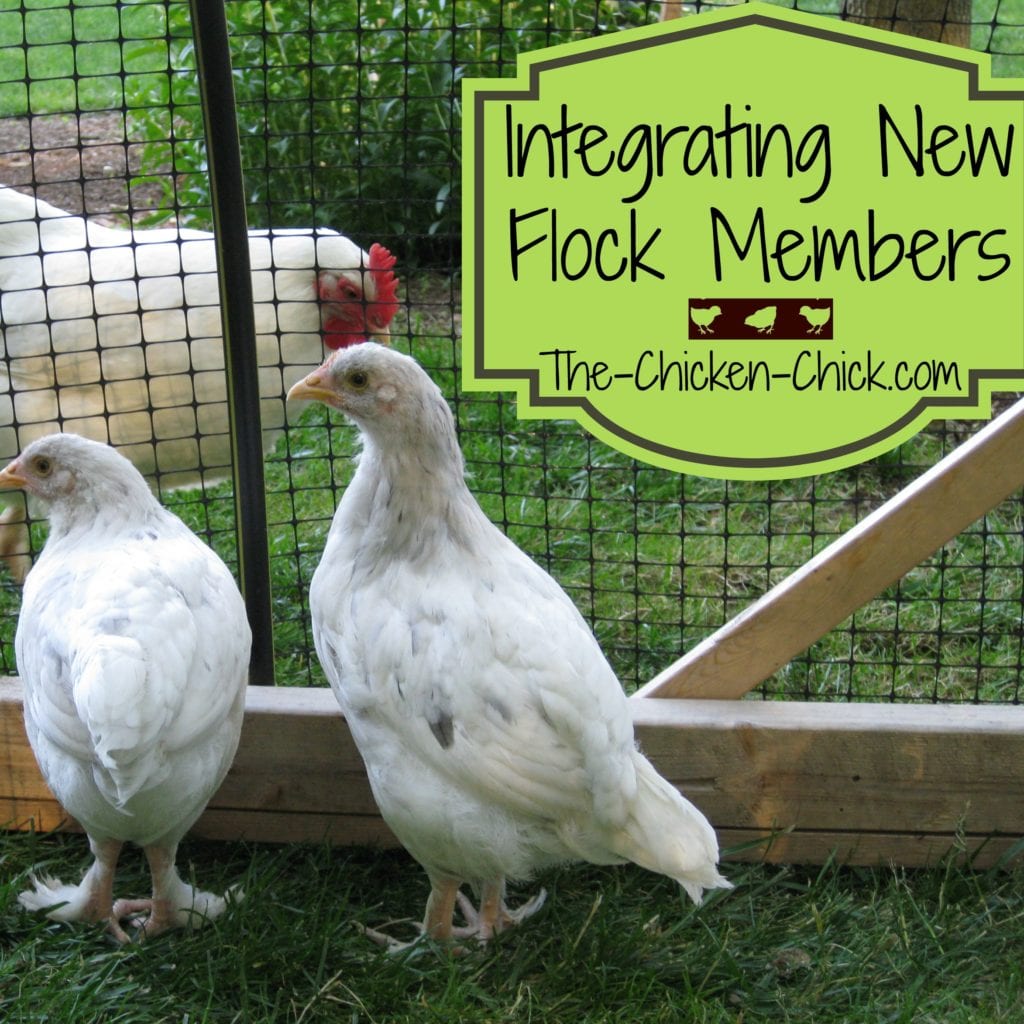
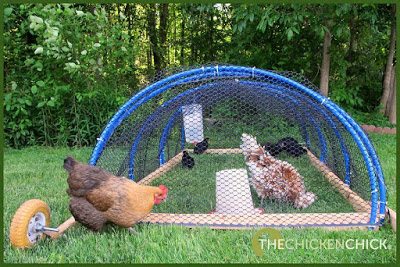
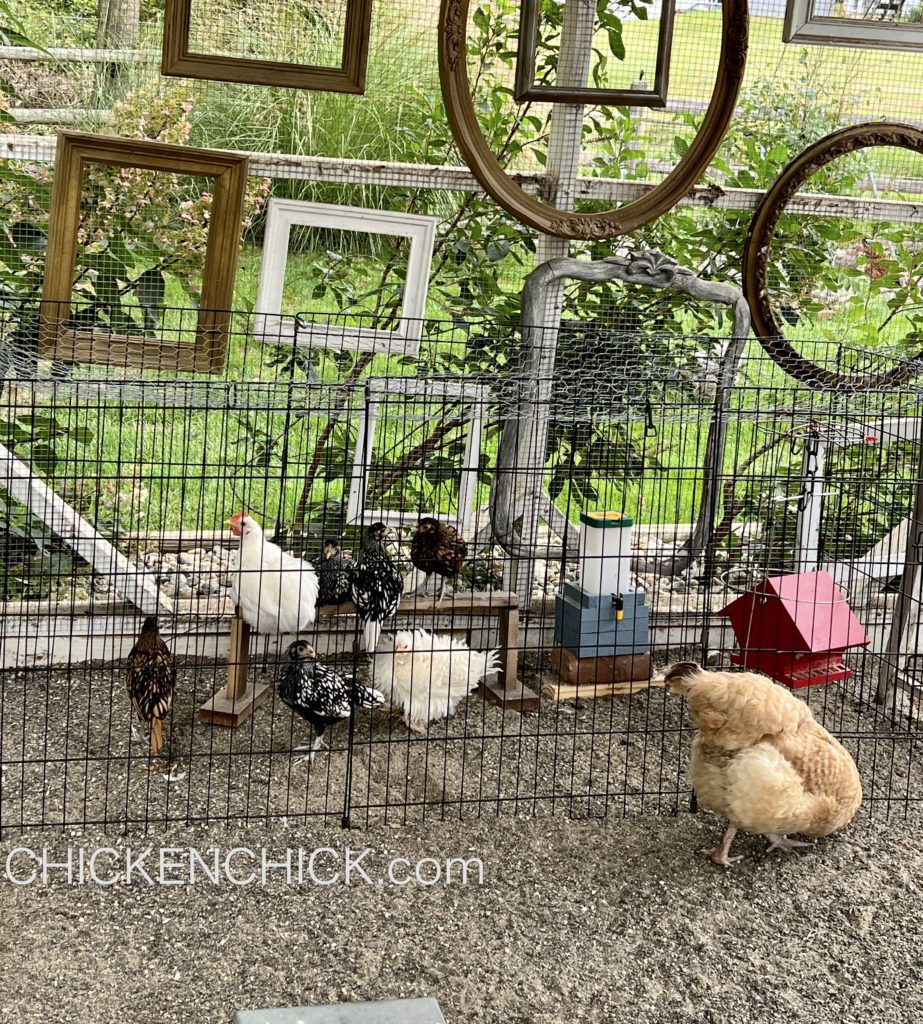
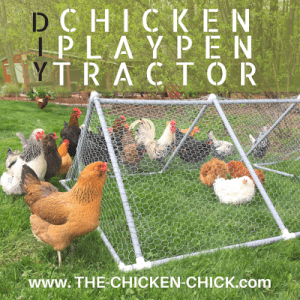
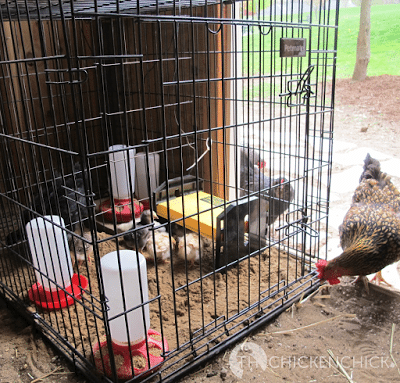














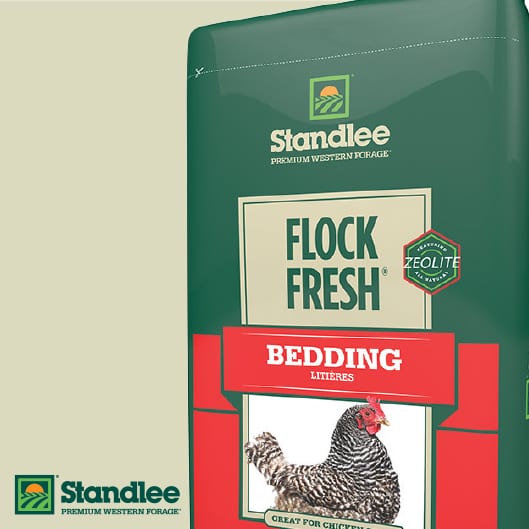












I did this when I integrated a group of young maturing cockerels into my established flock(which included 2 cockerels). After seeing each other for 2 weeks I did a bachelor day out with all roos together w/o the girls. It worked and everyone is getting along well with the girls included, though I do have a pair that seem to get in crowing wars throughout the day but nothing really physical besides normal flock behaviors.
Great Blog !! Glad I found you. I have 9 Buff Orpingtons that I raised from chicks. I originally bought 5 extras and raised them to the point where they could be kept outside in a coop and gave them to my niece…who has enjoyed them immensly but is now moving to a place where she cannot keep them. Soooo….I am getting them back and will be looking forward to introducing them within the week. I plan on bringing their existing coop to our property and setting it up right across from my chicken's outside run. I plane to free… Read more »
One week should be time enough, but if not, just corral the little ones back up and give them more time. You'll know pretty quickly whether everyone is ready for the transition. Just open the door for the littles to wander out at their leisure and observe the interactions.
The girls (and guy) spent their first day "together." We sectioned off a part of the yard and used the outside enclosure as one of the dividing walls. So they are seperate but can see each other. My girls got very excited at the first look at the newbies but soon calmed down and went on about their business. Since we were working on modifying our shed to accomodate the newbies we were outside with them and so decided to let the girls free range. All was well until we were gathering them up and corraling them into their outside… Read more »
Hi– I am hoping this thread is still live…. we have two new buff orps, 9 weeks, currently in a dog crate in our chicken run and separated from our 20 week old leghorn and Rhode Island Red by a chicken wire partition. I'm considering letting the two elders out to range today, but I'm wondering if it's okay to let the little ones have full run of the coop and run during the time the big girls are out, or will the big ones see that as a provocation, even if the new ones are back behind the partition… Read more »
This is the perfect post for us now-we have a few hens picking on one of our buff orpingtons. They've lived peacefully for weeks now but all of a sudden some of the older ladies decided they hated her. We put her in a separate pen with her buddy and will determine who the culprits are and separate them as well.
Hi Kathy. Thank you so much for the quick reply! These 2 chickens came from the same farm as my other 3. Yes, the run is fully enclosed with hardware cloth 3 feet up the bottom and regular wire from there including a fully enclosed top. We buried hardware cloth 2 feet out all along the perimeter. There is also a 7 foot high fence that surrounds it which is there free range area of 50 x 100 ft. I'm not sure where i would put them at night unless I brought them in the House in a dog crate… Read more »
I would still quarrantine them. There's no telling what diseases or conditions they could have. Even if all of your original flock members are well and were well when they arrived, that doesn't mean that the newbies could not be carrying some new sickness. It's just not worth the risk. As for the run: yours sounds like Fort Knox and if you're comfortable and feel that nothing could possibly work their way in there, it's your call. But personally, I'd rather bring mine inside than worry that a raccoon, who could tear through that 'regular wire' with no problem at… Read more »